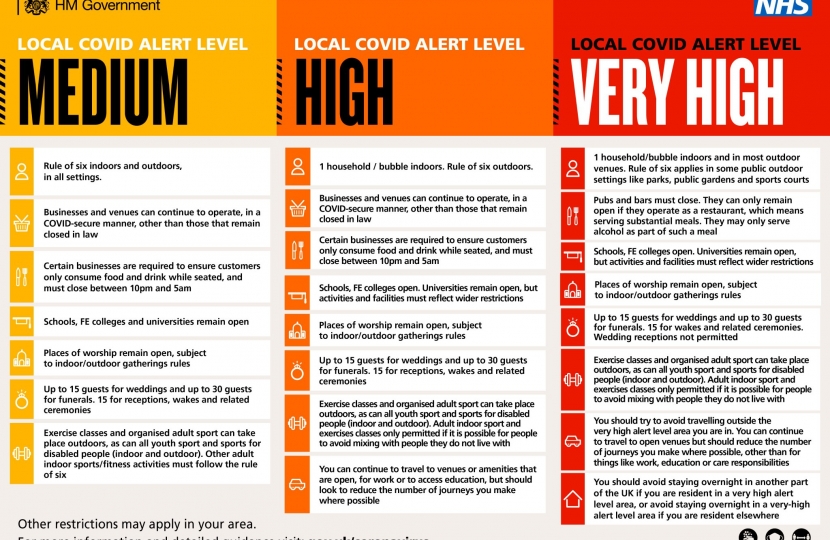
The government will further simplify and standardise local lockdown rules by introducing a three tiered system of local COVID Alert Levels in England. Addressing MPs before hosting a Downing Street press conference, the Prime Minister confirmed the levels will be set at Medium, High, and Very High.
The “Medium” alert level - which will cover most of the country - will consist of the current national measures, which came into force on 25 September. This includes the Rule of Six, and the closure of hospitality at 10pm. Telford is included in the Medium tier thanks to the hard work of residents in following social distancing and other coronavirus measures.
The “High” alert level will reflect many current local interventions, but there will now be consistency across the country. This primarily aims to reduce household to household transmission by preventing all mixing between households or support bubbles indoors. The Rule of Six will apply in outdoor spaces, including private gardens. Most areas which are already subject to local restrictions will automatically move into the “high” alert level.
The “Very High” alert level will apply where transmission rates are causing the greatest concern, based on an assessment of all the available data and the local situation. This includes incidence and test positivity, including amongst older and more at-risk age groups, as well as the growth rate, hospital admissions and other factors. In these areas, the government will set a baseline of prohibiting social mixing indoors and in private gardens, with the Rule of Six allowed in open public spaces like parks and beaches. Pubs and bars must close, and can only remain open where they operate as if they were a restaurant - which means serving substantial meals, like a main lunchtime or evening meal. They may only serve alcohol as part of such a meal. People will be advised not to travel in and out of these areas.
To create local consensus behind this more severe action, the government will work with local leaders on how individual areas should go beyond this baseline, which may include measures such as the closure of gyms, casinos, and leisure centres. Non-essential retail, schools and universities will remain open in all levels. Cases are rising rapidly across the country, particularly in the North East and North West, and this is resulting in increased hospitalisations.
The Prime Minster has said that further action is required now to suppress the virus and make sure the NHS isn’t overwhelmed, and can continue providing essential services such as cancer care. In recent months, local outbreaks have been tackled with targeted restrictions - helping save lives and avoiding the need to apply those measures nationally. However, over time this has led to different rules in different parts of the country, with some rules becoming increasingly complex and difficult to enforce. A postcode checker on gov.uk will show which alert level applies in each area and the NHS COVID-19 app will also direct people to this information.
Regulations for all three local alert levels will be laid today and they will be debated and voted on in the House of Commons tomorrow. Subject to that vote tomorrow, they will come into force on Wednesday, subject to the approval of Parliament. These measures will be kept under constant review, including a four-week sunset clause for interventions in “very high” areas. The PM also confirmed that the government will also provide Local Authorities across England with around £1 billion of new financial support. He also called on local leaders in the areas rated very high to work with the government on these measures, in return for more support for local test and trace, more funding for local enforcement, the offer of help from the armed services, and the Job Support Scheme as announced by the Chancellor.
Local COVID Alert Level - Medium
This is for areas where national restrictions continue to be in place. This means:
- All businesses and venues can continue to operate, in a COVID-Secure manner, other than those that remain closed in law, such as nightclubs.
- Certain businesses selling food or drink on their premises are required to close between 10pm and 5am.
- Businesses and venues selling food for consumption off the premises can continue to do so after 10pm as long as this is through delivery service, click-and-collect or drive-thru.
- Schools, universities and places of worship remain open
- Weddings and funerals can go ahead with restrictions on the number of attendees
- Organised indoor sport and exercise classes can continue to take place, provided the Rule of Six is followed
- People must not meet in groups larger than 6, indoors or outdoors
Local COVID Alert Level - High
- This is for areas with a higher level of infections. This means the following additional measures are in place:
- People must not meet with anybody outside their household or support bubble in any indoor setting, whether at home or in a public place
- People must not meet in a group of more than 6 outside, including in a garden or other space.
- People should aim to reduce the number of journeys they make where possible. If they need to travel, they should walk or cycle where possible, or to plan ahead and avoid busy times and routes on public transport.
Local COVID Alert Level - Very High
This is for areas with a very high level of infections. The Government will set a baseline of measures for any area in this local alert level. Consultation with local authorities will determine additional measures.
The baseline means the below additional measures are in place:
- Pubs and bars must close, and can only remain open where they operate as if they were a restaurant - which means serving substantial meals, like a main lunchtime or evening meal. They may only serve alcohol as part of such a meal.
- Wedding receptions are not allowed
- People must not meet with anybody outside their household or support bubble in any indoor or outdoor setting, whether at home or in a public space. The Rule of Six applies in open public spaces like parks and beaches.
- People should try to avoid travelling outside the ‘Very High’ area they are in, or entering a ‘Very High’ area, other than for things like work, education, accessing youth services, to meet caring responsibilities or if they are in transit.
- People should avoid staying overnight in another part of the UK if they are resident in a ‘Very High’ area, or avoid staying overnight in a ‘Very High’ area if they are resident elsewhere.

